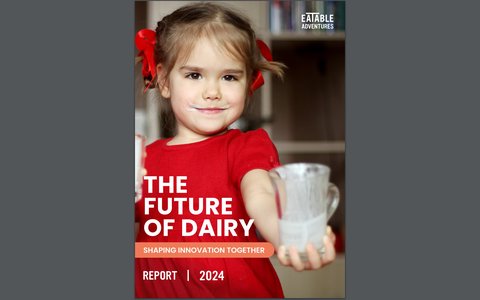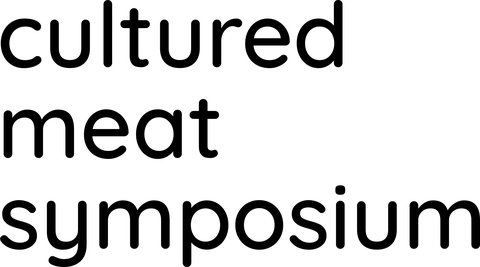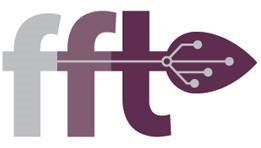Eatable Adventures Unveils "The Future of Dairy" Report
September 12, 2024 - 5 min read

New report reveals the technological innovations and the pivotal role of Open Innovation in reshaping the global dairy industry.
Madrid. September 12, 2024 — Eatable Adventures, the leading Foodtech accelerator worldwide, has released its latest report: The Future of Dairy. This comprehensive study explores the transformative impact of technology on the dairy industry, emphasizing the sector’s shift towards sustainability, hybrid products, and strategic innovation partnerships. The study gathers perspectives from medium to large companies across Europe, Latin America, and Asia, encompassing a diverse range of dairy industry players and facilitators.
Facing challenges such as climate change, labor shortages, fluctuating prices, and evolving consumer demands, the dairy industry is adopting innovative strategies to ensure its sustainability and competitive edge. Currently, the dairy industry is playing a leading role in advancing technology and innovation within the food sector, positioning itself as a central force in promoting food sustainability and resilience.
The global dairy industry, valued at $944 billion in 2023 according to data from IMARC Group, is projected to grow to $1.3 trillion by 2030, with a compound annual growth rate (CAGR) of nearly 5%. Over 80% of the world’s population consumes dairy products regularly, with global milk production surpassing 950 million metric tons in 2023.
Despite traditionally lower dairy consumption in East Asia, China has increased its milk production by nine million metric tons over the past decade. India leads the global rankings for annual fluid milk consumption, surpassing the European Union and the United States by more than three times in 2023.
A new era for Plant Based Dairy: Moving toward scaling up technologies
A major focus of the report is the consolidation of plant-based alternatives in the dairy market. Plant-based milk options, including soy, oat, coconut, and nut-based products, have become mainstream, reflecting shifts in consumer preferences and a greater emphasis on sustainability.
Valued at $12.6 billion in 2023, the global plant-based dairy market is projected to double to around $26 billion by 2030, with an anticipated CAGR of nearly 11%. The Asia-Pacific region leads in plant-based dairy sales, far outpacing North America. Despite this growth, traditional dairy products still hold the majority share of consumer preferences, with more than a third of consumers trying plant-based alternatives for the first time since 2020.
Investment in plant-based dairy peaked in 2020-2021 but declined by over 90% in the subsequent two years. Nonetheless, the category has matured, with more focus on later-stage investment rounds, indicating a move toward scaling up technologies and improving product quality, particularly in terms of nutrition and taste.
Technologies such as precision fermentation and cell-based methodologies have captured the spotlight, both for their potential as alternative dairy solutions and for the media coverage they receive. Meanwhile, emerging techniques like molecular farming, plant-cell fermentation, and computational biology are quickly gaining momentum, poised to further revolutionize the dairy landscape.
Open Innovation: the power of collaboration
According to the companies interviewed in the study, consumer behavior emerges as the primary concern for the dairy sector, as it contends with rising production costs and shifting consumer preferences. Hyperinflation has driven up dairy prices, prompting many consumers to opt for more affordable white-label products. Moreover, younger generations, particularly millennials and Gen Z, are increasingly focused on sustainability and health, influencing their dietary choices and creating new challenges for traditional dairy producers.
Unsurprisingly, the industry is also grappling with sustainability and climate change. Reducing greenhouse gas emissions and enhancing sustainability practices are now top priorities for many dairy companies. The sector is working to develop guidelines and policies to address these environmental concerns while also adapting to the broader impacts of climate change on dairy farming.
Industry leaders assert that competition presents a primary challenge, originating not just from within the traditional dairy sector but increasingly from innovative startups. In this framework, collaboration among players and the implementation of open innovation tools present an opportunity to explore and overcome competitors who become collaborators.
In this challenging landscape, the industry seems divided between those who view the new technologies used in the creation of alternative dairy products as innovations limited to the laboratory and those who are open to adopting them as a new source of diversification.
The report highlights the growing trend of collaboration between corporations, startups, universities, and research centers, which is becoming a cornerstone of open innovation in the dairy industry. These partnerships allow companies to access external knowledge and talent, driving technological advancements and improving sustainability efforts. Beyond product development, these collaborations also address broader sustainability goals, encompassing economic, social, environmental and nutritional dimensions.
However, aligning the interests and goals of corporations and startups can be challenging due to differences in organizational culture, scale, and strategic priorities. A key obstacle is the differing timelines for development and market entry. According to José Luis Cabañero, Founder and CEO of Eatable Adventures, “These partnerships enable startups to scale faster while providing corporations with efficient access to new technologies. Success in the sector depends on the ability to scale emerging technologies, achieve price parity, and meet evolving market demands.”
“This report outlines our vision for a technology-driven future for the food sector, where innovation not only positively impacts the planet but also promotes industry best practices and benefits consumers. Industry leaders must actively shape the future rather than merely observe it. We call on all stakeholders involved in this transformation to adopt forward-thinking practices and integrate cutting-edge technologies that enhance sustainability and efficiency”, says Cabañero.
To explore the full findings of the report, download the “Future of Dairy” report in this link.
About Eatable Adventures
Eatable Adventures, the leading Foodtech accelerator worldwide, strives to transform the food system prioritizing equity, health, sustainability, and resilience for all. By partnering with startups, corporations, governments, and investors, the company drives innovation from seed to table, embracing cutting-edge technological solutions in the Agrifood sector. With a thriving global presence, Eatable Adventures has achieved significant impact worldwide, boasting a vibrant community of 25,000 changemakers, 12 acceleration and incubation programs, over 50 corporate and government initiatives, and a €30M investment fund to support early-stage projects.
Each year, Eatable Adventures accelerates over 100 startups through its programs, driving the growth and consolidation of the Agrifoodtech ecosystem on a global scale.

















